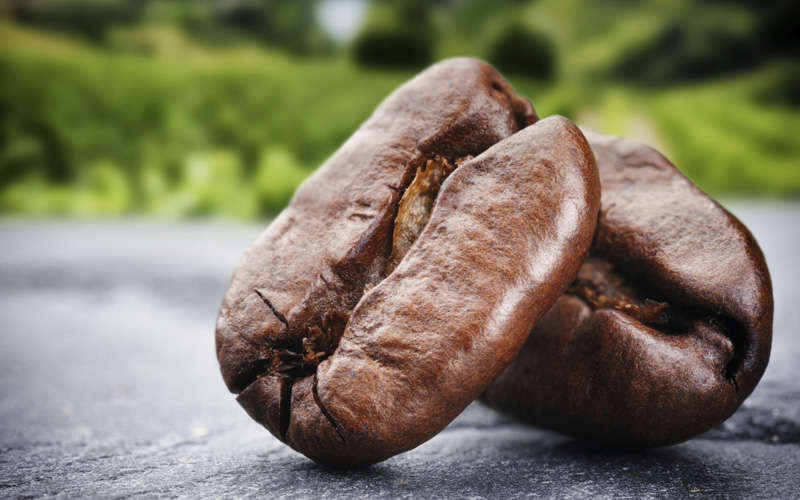
by guest blogger Sandy Riggen, owner of Brown & Jenkins Coffee Roasters
What’s the first thought that comes to mind upon seeing the word “organic?” Today’s savvy coffee lovers (that would be you) will answer in unison: pesticide free. Ah, but we also know that you also enjoy savoring a fresh cup of coffee while absorbing deeper knowledge about topics close to your heart and values. We believe organic coffee is just one such topic, and there’s more to it than simply a lack of pesticides.
Maria Rodale has been drinking our organic coffees for years (her favorite is our Organic Peruvian). We’re quite honored by this, and we were delighted when she invited us to contribute to her blog about the ins and outs of organic coffee. So pour a fresh cup—we’re about to quench your thirst for knowledge…
Pesticides and Herbicides
Brown & Jenkins has been roasting coffee in Vermont for more than 30 years. We’ve learned a thing or two about coffee during this time, and we continue to learn more every day. For instance, did you know that coffee plants are among the most heavily pesticide- and herbicide-sprayed crops? But if you’re drinking nonorganic coffee as you read this, don’t panic and throw it down the drain. We’re not about to fill you with fear. A considerable amount of the substances applied to coffee plants are destroyed during the roasting process. However, it’s true that organic beans start out clean—and some coffee drinkers can taste the difference. Plus, a clean start without pesticides or herbicides in the mix certainly means more peace of mind for you.
Other Chemicals, Too
Coffee beans are washed after harvesting. This sounds reasonable enough, but many conventional methods use ammonia or chlorine during this process. While the beans are rinsed, some traces of these chemicals may remain. If you drink city water, chances are you ingest more chlorine right from the tap than from your coffee grounds. But if you’re trying for a chlorine-free lifestyle, stick to drinking organic coffee. Incidentally, try making coffee with bottled, chlorine-free spring water. You will be amazed.
Chlorine is certainly not the sort of flavor you want in your cup—but if it’s flavor you crave, we recommend Organic Healthy Living Blend. It’s placid and sweet, with notes of cinnamon and oak.
The Coffee Growers
There are numerous articles out there about the benefits of organically grown coffee for the environment, but we seldom hear of the direct benefits to coffee growers. We’re becoming increasingly sensitive to the work conditions in foreign countries. The greatest impact of those pesticides and chemicals mentioned above is on those who grow and harvest the coffee: Their exposure to the products used in the cultivation and processing of conventional coffees is far greater than the exposure we may experience at our end of the process, in our cups. Granted, measures to keep coffee growers safe are increasingly enforced, but it’s good to know that when you purchase organic coffee that you’re also encouraging healthier work environments for workers in the coffee industry.
Why It’s Not Always More Expensive
As you might imagine, organic coffee costs more per pound for roasting companies. This is especially true for small, rural roasting facilities (such as Brown & Jenkins) that purchase their coffee beans in small, fresh batches. However, you may be surprised to know that the number of coffee drinkers who choose organic over conventional coffee is about equal. By offering both varieties to their customers, many coffee roasters are able to find a happy medium and keep the purchasing experience simple by applying the same price to either product. This is what we call a customer-friendly approach.
We raise our cup to you!
 Sandy Riggen has been the owner of Brown & Jenkins Coffee Roasters in Vermont for 10 years. The third owner in the company’s 31 years, Sandy helps keep its strong traditions and high standards for quality, freshly roasted coffee alive, roasting and shipping orders the same day. She is also the mother of four and grandmother to a growing flock of eight. An avid cook and organic food activist, Sandy has been in the food business most of her adult life. Before purchasing Brown & Jenkins, she was owner of Country Fare Catering, which she operated for many years. Brown & Jenkins is a great fit, and given her love of great food and coffee, she continues to talk and write about different ways to combine cooking with coffee on her blog.
Sandy Riggen has been the owner of Brown & Jenkins Coffee Roasters in Vermont for 10 years. The third owner in the company’s 31 years, Sandy helps keep its strong traditions and high standards for quality, freshly roasted coffee alive, roasting and shipping orders the same day. She is also the mother of four and grandmother to a growing flock of eight. An avid cook and organic food activist, Sandy has been in the food business most of her adult life. Before purchasing Brown & Jenkins, she was owner of Country Fare Catering, which she operated for many years. Brown & Jenkins is a great fit, and given her love of great food and coffee, she continues to talk and write about different ways to combine cooking with coffee on her blog.




There is NOTHING in this world better than fresh organic free trade coffee!! I couldn’t make it through the day without it. Thanks, Sandy, for all you are doing to keep those of us alive who can’t live without great organic coffee. May you continue to do what you love and love what you do!!
Thank you SANDY!!!! Just finished my morning cup of Peruvian just now and catching up on my blogs. Yours is still the best. 🙂 And nice to see a picture of you too!